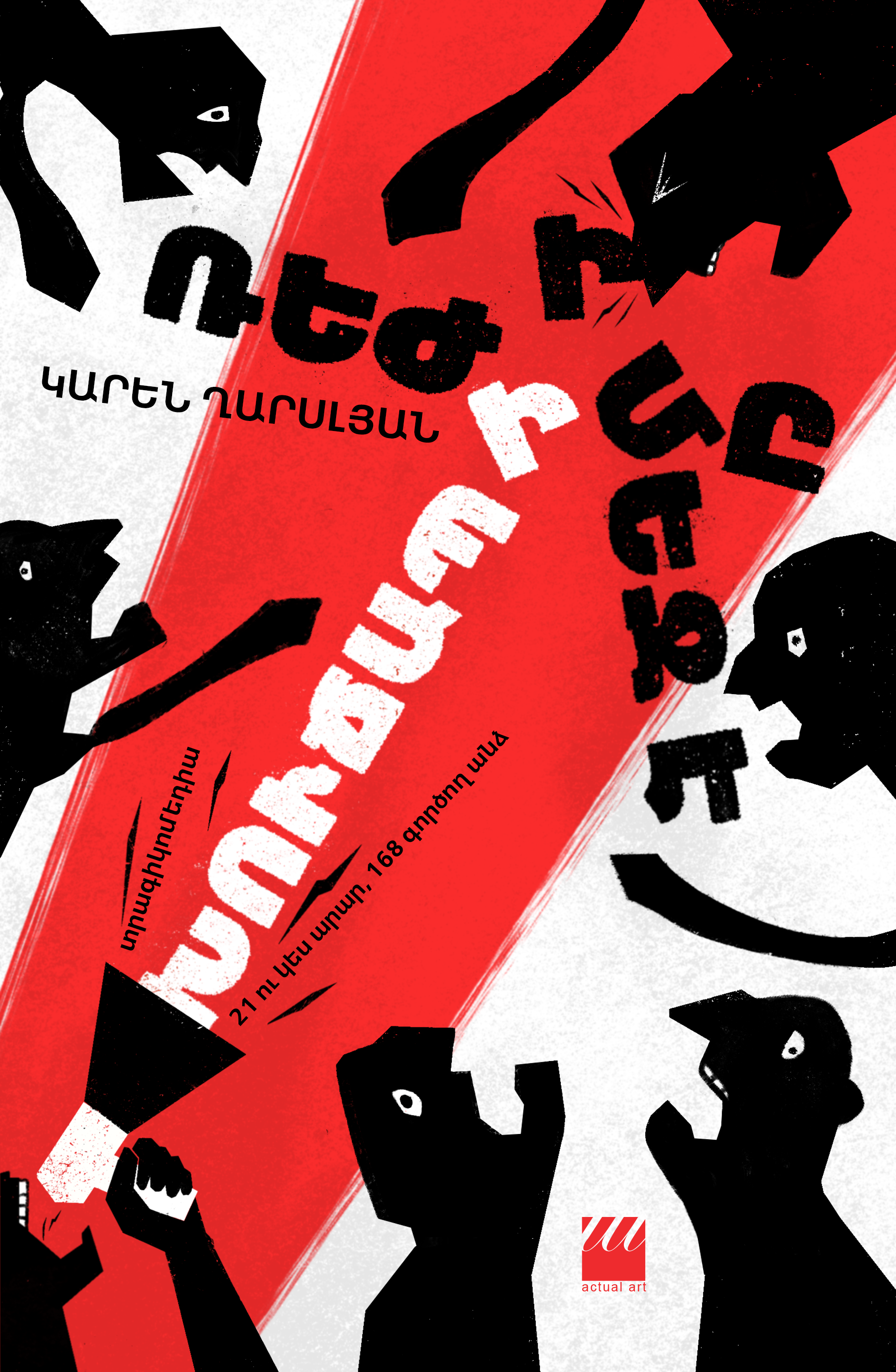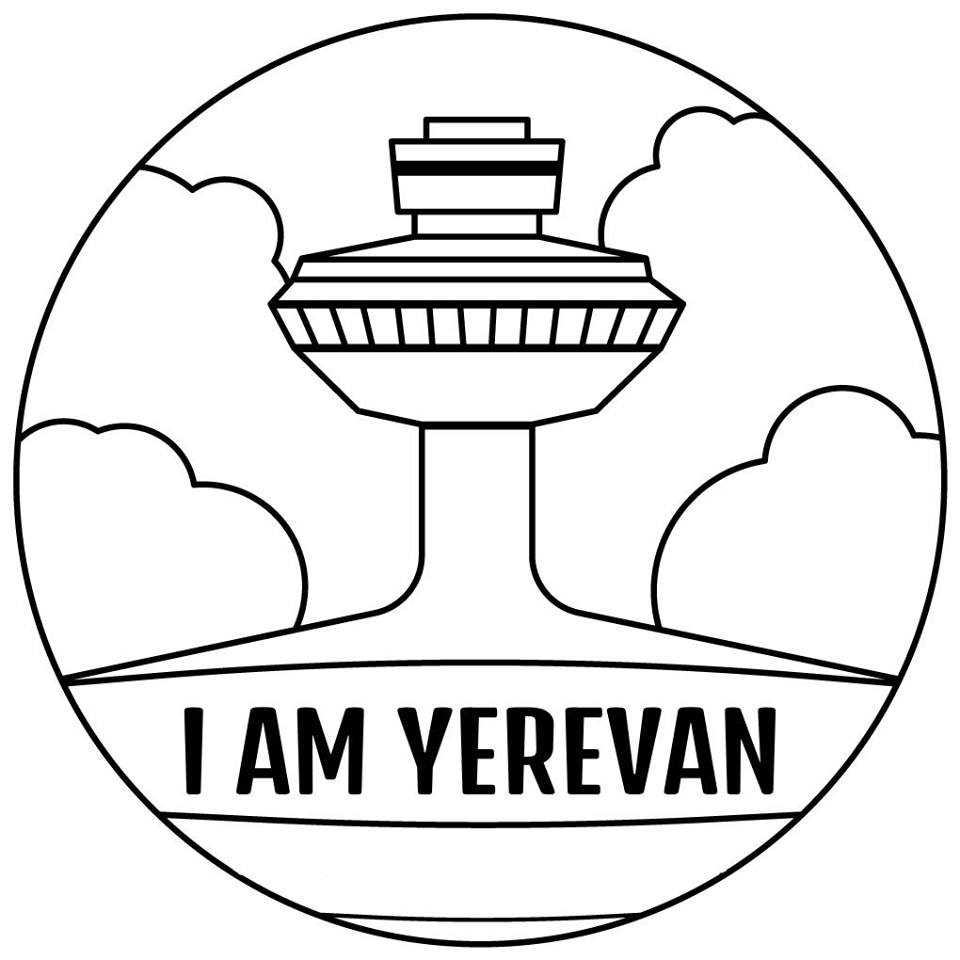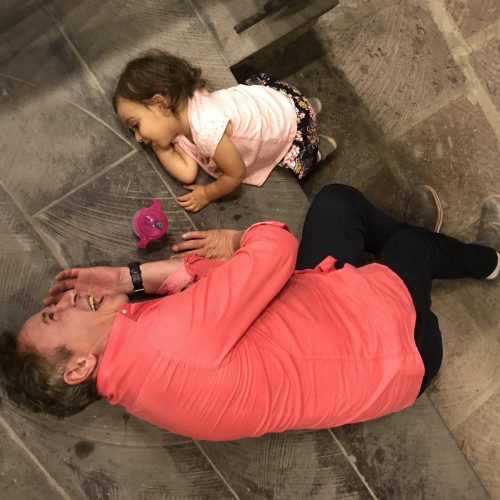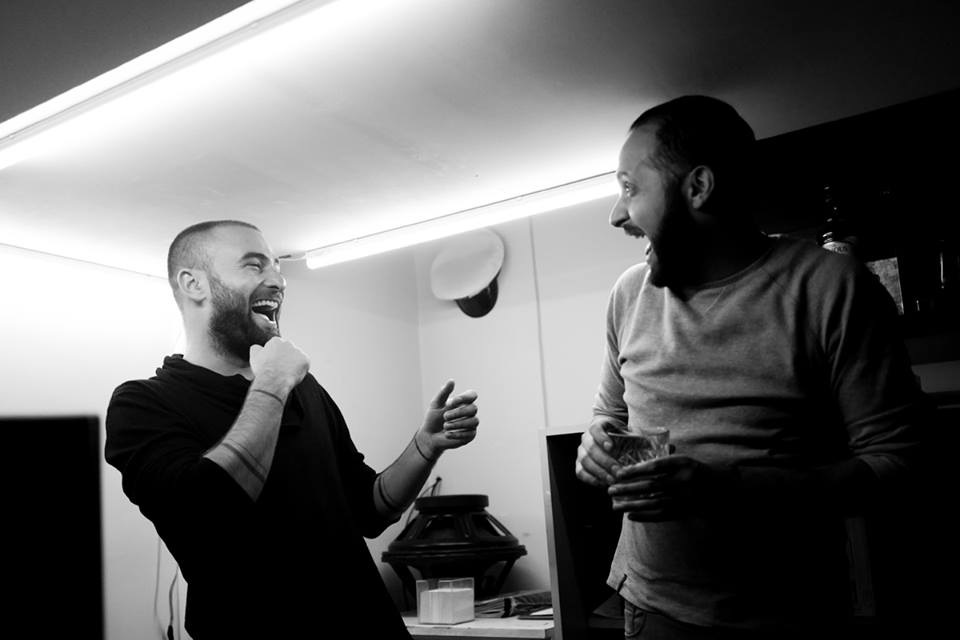
Artyom Manukyan
May 29, 2019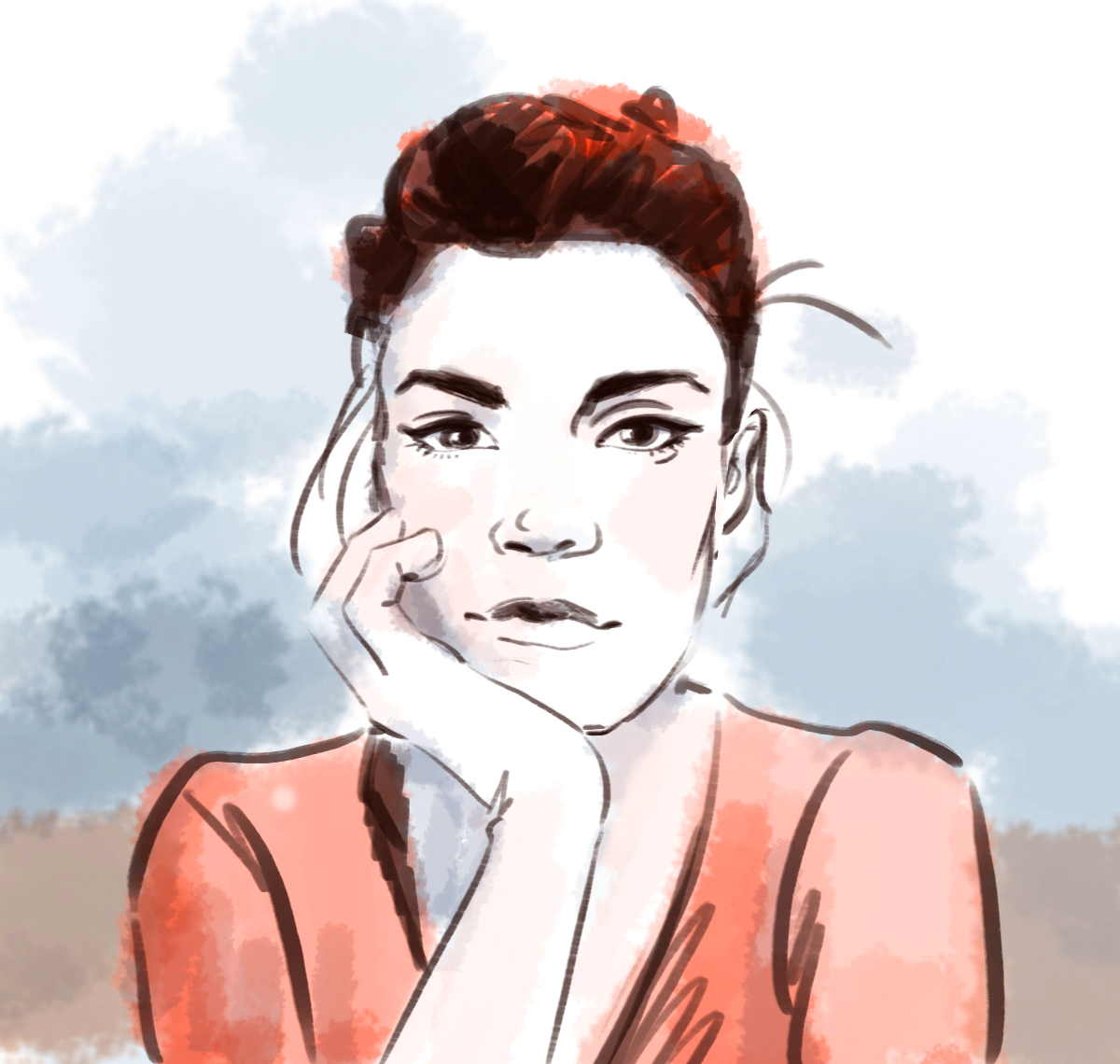
Anja Shu
June 2, 2019In Finnegans Wake James Joyce tells the story of a certain Dublin family — except he invents his own words (some of which are very, very long) and blends languages in order to do so.
In his typographic film Aterazma, Karén Karslyan takes certain words and literally tears them apart, cuts some letters out of the words, watches patiently as they fall off the pages, burns them.... Aterazma is a difficult mass of information to digest. But it offers you a different kind of reading experience. Truly one of a kind.
The author's new play The Regime is in Panic is being staged in Yerevan and promises to be quite a spectacle. For more information, please visit Teck Degh.
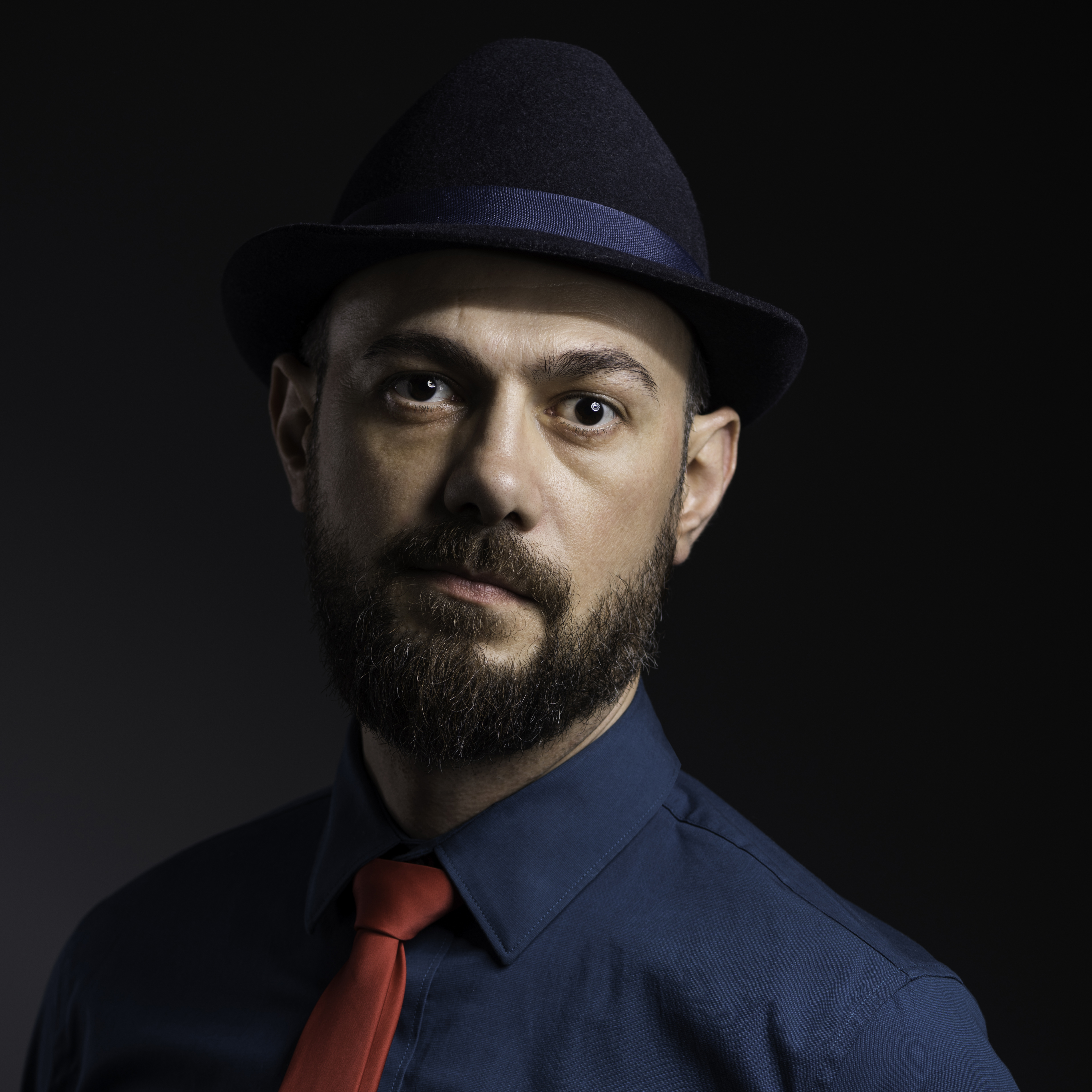
Photo by Tigran Hayrapetyan
You are probably the most intriguing Armenian intellectual I have met in the past few years. Is it a result of school education or you're self-taught?
Karén: That’s quite humbling. I’m more used to differing, if not altogether opposite, opinions. The 90s were some of the worst times to attend a university in war-torn Armenia, which was trying to rise from the ruins of a fallen empire. Widespread corruption and the economic crisis had crippled the educational system, as well. I had to study alongside dozens of students who had been admitted to the university thanks to their parents’ bribes. Even though my alma mater remained a valuable source of schooling, corruption and poverty necessitated accentuation on self-education to strive for adequate intellectual growth.
You've tried writing in different formats and even created your own format with Aterazma. Do you consider yourself an experimental writer?
Karén: Yes. That implies an unceasing quest of new forms of expression, which is as exciting as it is fraught with disappointments. But I like challenges. Aterazma is, indeed, a crucial benchmark for me in that I found a way to mix three of my greatest artistic passions — writing, drawing, and cinematography — and extract new meanings. With Aterazma, a typographic film/novel, I began dissecting words and working with their internal organs. After Aterazma, I no longer look at words the same way as before. I feel like I’m wearing a pair of lexical x-ray machines instead of a pair of reading glasses. Conventional means of expression are often only good enough to serve as raw material for experimentation. In this regard, I am particularly drawn to constrained writing, which underlies both Aterazma and my upcoming tragicomedy, The Regime in Panic.

I, personally, think your recent book was a success as it not only looked weirdly interesting, it had metaphoric and aesthetic ingenuity and construction. Tell us about the ideation of the book concept.
Karén: The conception of Aterazma was an aftermath of the 4-day April war between Azerbaijan and Armenia in 2016. The tragedy of seeing a multitude of teenagers’ corpses on the conveyer belt of the war stunned me. I awakened from the stupor when I saw the word ‘երազ’ (‘dream’) inside the word ‘պատերազմ’ (‘war’) and, instinctively, rushed to break it free from the confinement of the surrounding letters. But instead, I created a poster where crushed was the word ‘dream,’ while the surrounding letters remained intact, in an attempt to symbolize the demise of each and every soldier on both sides. That single poster eventually became the cornerstone of a 480-page novel that I described as a typographic film.
After discovering the word ‘dream,’ I further dissected the word ‘war,’ discovering such hidden words and roots as ‘dad,’ ‘hate,’ ‘wall,’ ‘lord.’ The dissection of the word ‘գարուն՛ (spring), brought forth ‘արուն’ (blood) hidden in plain sight, etc. In that sense, the book is like a frontline, a military hospital or a mass grave filled with decapitated, mutilated, quartered words that have lost their original meaning, adopted new ones or lost all sense altogether. Cutting off letters, disfiguring grammatical and lexical structures that created new texts was as close as I could come to portraying bellicose destruction.
Each page is treated as a shot or a frame that animates the narration. For instance, a well-known statement by a prominent writer transforms page after page as certain letters start falling off. I have used various experimental techniques for different chapters of the book. For instance, the principle behind the constrained writing technique employed for the text of the first chapter is the usage of only those words that are composed exclusively of the letters that spell the word 'պատերազմ՛ (war).
Virtually an untranslatable Armenian work, Aterazma garnered some attention outside Armenia’s physical and linguistic borders. In 2018, I had the honor to deliver a lecture on the book, entitled “Dismembering Words: Language as the First Casualty of War”, at the Coimbra University, in Portugal, at the invitation of the Center for Social Studies and with the sponsorship of the Gulbenkian Foundation.
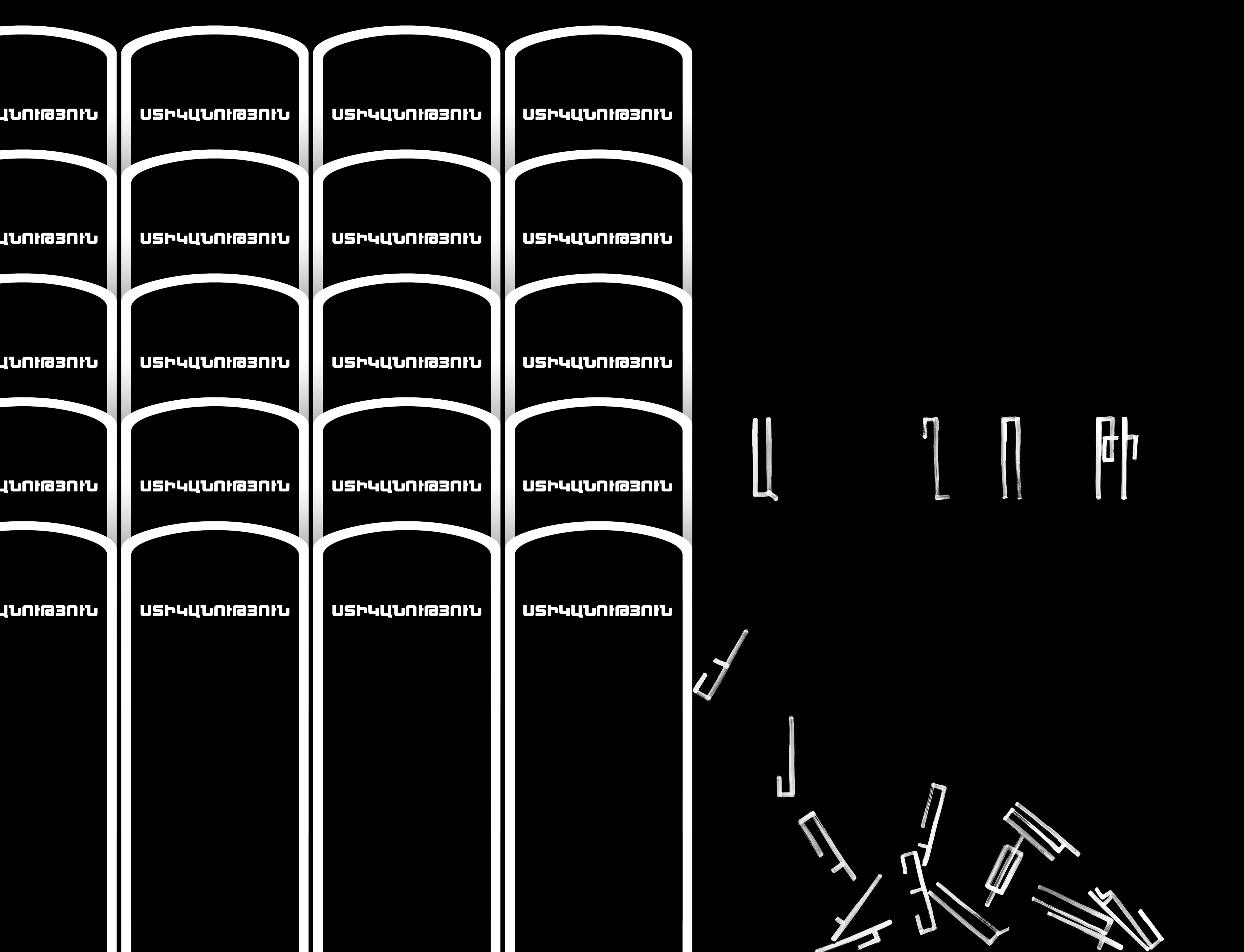
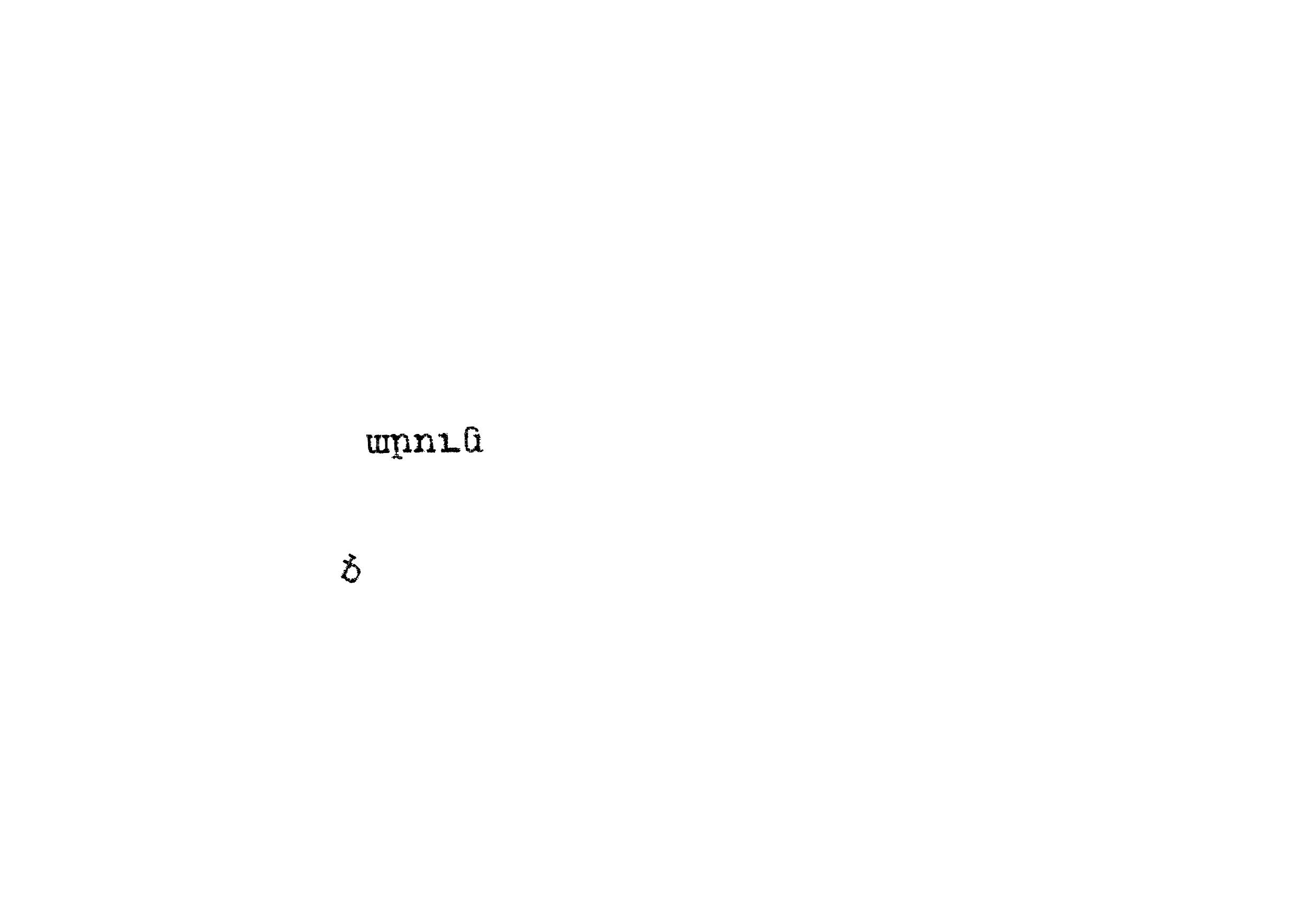
What were the responses from publishers when they saw Aterazma for the first time?
Karén: A mixture of awe and bewilderment. It was hard for them to make heads or tails of the storyline.
What is the most important thing about that book?
Karén: Within the context of mutual extreme hostility between the Azerbaijani and Armenian people, Aterazma stands out as a book that doesn’t mourn or rejoice the death of a soldier based on his ethnic background. The soldier, the conscript is portrayed as just homo sapiens that becomes victim to the mutual aggressive abhorrence of two ethnic groups. The book calls for a peaceful dialogue between them. Alekper Aliyev, a Switzerland-based Azerbaijani writer, gladly accepted my request have parts of the book translated into his native language. So, at least our languages coexist peacefully in Aterazma.
You're obviously not writing for general reading public. Do you write for a specific audience in mind?
Karén: I don’t discriminate between audiences. However, since my writing is often quite heavy with unattributed quotes and references, a well-versed reader might reap a richer harvest.
You play with words, break them apart, find or make up new words and attach meanings to these words. What is the significance of a language in its written and spoken form for your experiments? Do you believe that the language we are born into can play a role in shaping a collective mentality, or rather a national identity?
Karén: By playing and breaking the words apart I am elbowing my way to my roots – the childhood. We begin actively cognizing the world by breaking things apart. That is an era of unprecedented surprises and euphoric discoveries. In a way, I replicate, as an adult, that method of world cognition using language to achieve similar experiences.
Fortunately, the profound impact of the language on people’s worldview has been substantiated by sufficient research over the centuries. But this conclusion may seem to be questionable when we consider the Armenian language, which is generally considered gender-neutral. On the one-hand, we see the Western democracies that strive for gender equality and struggle to tweak or hack their languages to make them gender-neutral. On the other hand, we have Armenian, which has a reputation of being one of the rare gender-neutral languages on Earth. Is it? Armenian not only lacks masculine, feminine or neutral nouns and verbs but also pronouns. Now has this gender-neutrality in any way contributed to shaping society and culture where men and women enjoy equal rights and opportunities? Has this gender-neutrality contributed to tolerance towards LGBTQ? Nowadays Armenia is one of the most homophobic countries in the world, championing patriarchy with egregious displays of toxic masculinity, male superiority, and female inferiority. I believe it would be more accurate to describe Armenian as not a gender-neutral, but a predominantly male-only language. In the history of the Armenian language, there have been many attempts to create a feminine personal pronoun (նե), yet no one ever has tried to create a masculine one. The Armenian third-person personal pronoun նա is not gender-neutral, it’s masculine.
The good thing is that Armenia has laws that do ensure equal rights and opportunities for all citizens without any discrimination (even though many Armenian citizens find it immoral). However, it should be remembered that most of them have largely been imported from, influenced or inspired by cultures that have been shaped by gender-heavy tongues, the Romance and Germanic languages.
Karén, I know you do translations and have been attacked in the media for not sanitizing the original work while translating into Armenian. Why is our society so afraid of curse words in literary works? Where do you see the roots of this problem?
Karén: That’s quite unfortunate that some translators do validate the social pressure by sanitizing foreign literature. Although it has to be emphasized that it’s less and less common. A curious example is the Armenian translation of Louis Aragon’s Le con d'Irène (Irene’s Cunt). Even though the translator was honest enough to use the adequate Armenian equivalent of the word ‘pussy’ in the work itself, she (or whoever made the final decision) was nevertheless too shy to put it in the title. As a result, Irene’s Cunt was rendered as Irene’s Slit («Իռենի ճեղքը»).
As far as I know, it was not the decision of Inknagir, which published the book. Back in 2015, I was commissioned by the same publishing house to translate Kathy Acker’s Lust. I did the utmost to render every single ‘embarrassing’ word as accurately as possible without any censorship from the publisher. Last year, a few people discovered the book and made a shaming post on Facebook, criticizing me for using unembellished obscenities, not whether my translation was accurate or not. After I engaged them in a dialogue, they deleted the post.
There is so much hypocrisy surrounding this issue. Even though offensive language flourishes in everyday speech, local literature is predominantly devoid of this layer of language. But it’s changing. If back in 2003, my first book, X Frames/Sec, was thrown out of a couple of bookstores in Yerevan for use of vulgarisms in a few spots, nowadays books that contain obscenities are tolerated without causing too much controversy. Still, such authors are almost exclusively male. Interestingly, in Armenian society, offensive language is predominantly a male prerogative, which should not be exercised in the presence of women. They not only ought not to use hardcore offensive language but also ought not to be exposed to it.
What’s preposterous is that most of the Armenian dictionaries published in the 20th century have excluded all the profanities. Realizing that the rich idiomatic heritage associated with the word ‘քաք’ (shit) cannot be ignored, Bediryan’s dictionary of Armenian idioms kept the word but spelled it with an asterisk. A dictionary!
Your Mother of Nation statue meme got brutally attacked in the media a few years ago. You kept responding to some haters by engaging in an argument with them. How have you changed since? Would you give a fuck if it was 2019?
Karén: It was definitely a fun experience, despite the torrent of cussing and hate speech. I ended up blocking a bunch of people, but not until I tried engaging them in constructive dialogue. It was back in 2012 when the meme culture was still alien to the general population of Armenia. I wouldn’t mind engaging in such dialogues. After all, thanks to them I gained a lot of supporters and Facebook friends.
Is there a book you keep going back to again and again?
Karén: James Joyce’s Finnegans Wake has always been an important source of inspiration for me. He pushed the language to its limits and ushered an era of experimentation. More often I go back to The Color of Pomegranate, which I have probably watched more than fifty times. His style of story-telling has been another important source of inspiration.
You play guitar, you paint, draw caricatures, write books, anything else?
Karén: Photography is another passion I pursue in my spare time. I love film-making and hope to dedicate more time to it. I also translate fiction and poetry. But outside arts and literature, I’m an Armenian-Russian-English medical interpreter helping patients with limited English proficiency communicate with health professionals.
After chatting with you on the phone and learning that you've been researching every possible media outlet since 2011 for the new play, seems like research is very important part of your project. How long did it take you?
Karén: For The Regime Is in Panic, I began searching every nook and cranny of the web, in 2011, to unearth the phrase ‘the regime is in panic’ and its derivatives. In a week, I found a treasure trove of articulations made from 2001 to 2011 and published a blog post. I hoped that soon the phrase will become history. But more and more politicians and journalists proved me wrong as time went by. Soon, I became an avid collector and was getting delighted upon running into a familiar expression. At some point, I think back in 2015, I conceived the idea of weaving these artifacts together and turning them into a play. ‘Panic’ had become Godot of the Armenian political stage. Just as Vladimir and Estragon, the opposition and people were desperately waiting for that promising panic of the authorities to finally occur, but it wouldn’t. So, I finished the play a few months before the 2018 revolution, when there was no tangible hope for Serzh Sargsyan’s corrupt regime to go anytime soon.
But after the revolution, I revisited the play and included the revolution and the aftermath. Most importantly, 92 pages of this 300-page book are my illustrations of the 6 most prominent movements in the history of independent Armenia aimed at toppling the corrupt regimes from 1996 to 2018. These are Aterazma-style animated illustrations where letters and words fall off as a result of police brutality to form new meanings.
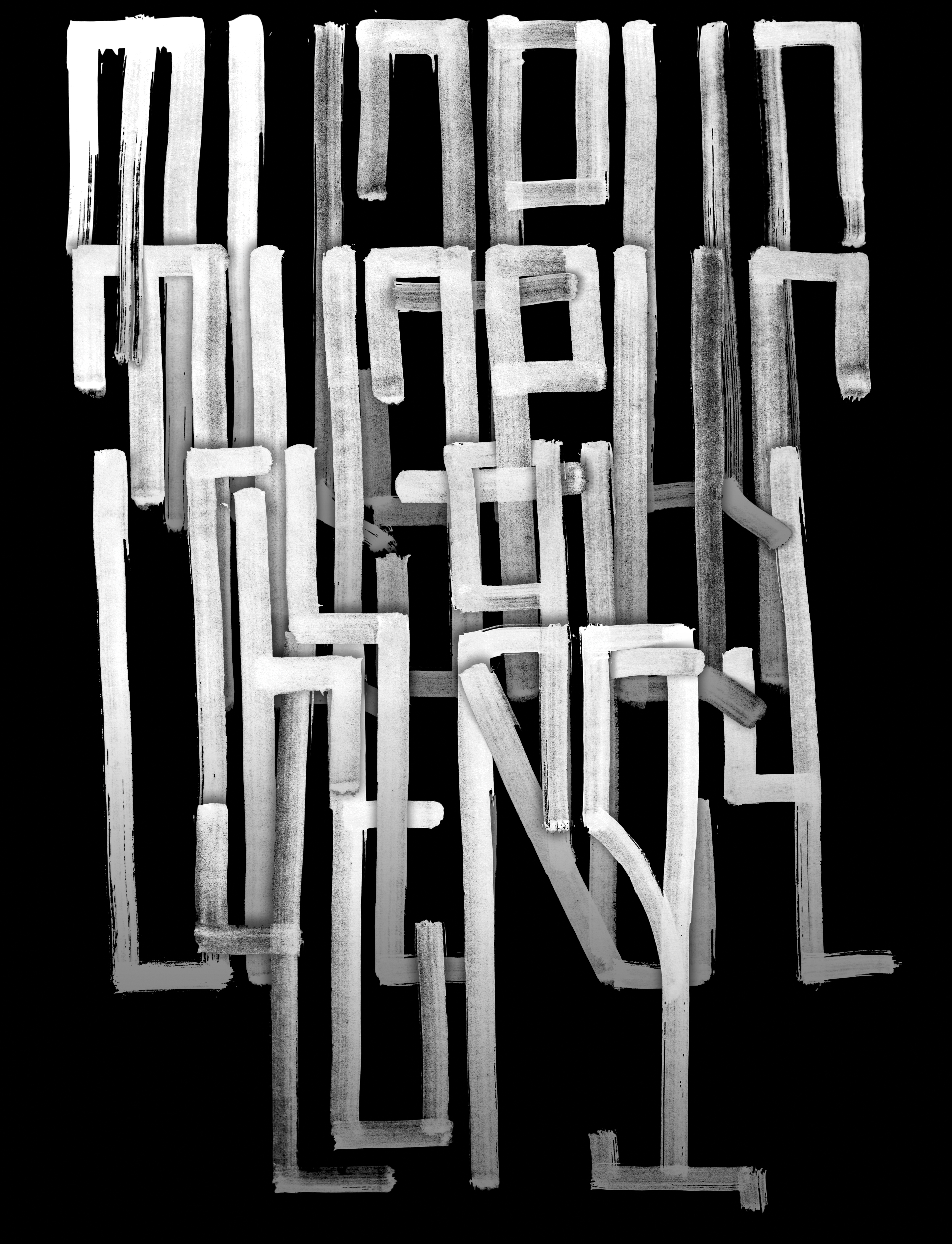
(khuchap) Panic-word, the origins, the meaning, the acute pain that it causes every time you hear it after it's been literally abused in our media. What do you feel when you hear the word? or read it?
Karén: Interestingly, Hrachya Acharyan conjectures the Arabic hijab is a possible ancestor of the Armenian word խուճապ. But I also discovered that panic was named in honor of Pan, the ancient Greek god of the wild, shepherds and flocks, whose ability to incite panic was believed to be the main cause of the Persian army’s defeat in the Battle of Marathon, back in 490 BC.
The last time I got annoyed upon hearing the word ‘panic’ in the Armenian political discourse was back in 2011. For over a decade, different political and public figures had been periodically insisting that ‘the authorities are in panic’ and that ‘the ruling pyramid is about to crumble.’ Despite the fact that their prophecies turned out to be misleading, the phrase had become a sort of brand of the opposition. After smirking and rolling my eyes one day in November of 2011, I had a eureka moment, I decided to collect all those claims, strip their context and put them side by side in a chronological order to extract farce out of this discourse.
Your book is turning into a performance. Let's talk about this. Who is staging it? When and where?
Karén: Poet, actress, and director Nanor Petrosyan is staging it with the Tech Degh amateur troupe of 12 actors. The premiere is going to be on June 18, at the Center for Contemporary Experimental Art (a.k.a. NPAK). Check out their page, Tech Degh, to get more detailed updates. I will, unfortunately, miss the premiere of my first ever play since I have to leave Armenia a bit earlier.
How do you feel about the play? Any worries? Do you feel the "panic"?
Karén: I was slightly worried at the beginning when the director, after having agreed to stage this weird play, was unsure how to do it. The play evolved from a simple stage reading to a full-blown theatrical performance with 12 actors. They’ve been rehearsing the play for a little less than half a year. I have already seen a couple of rehearsals, and I have burst out laughing on a few occasions despite the fact that I have perused every word of the play ad nauseam. Nanor has a unique vision. In certain acts, she has deviated from the script considerably. And I respect her choices. I am really happy that my book illustrations will be projected during the play. Overall, I have high expectations. The book and the play complement each other.
